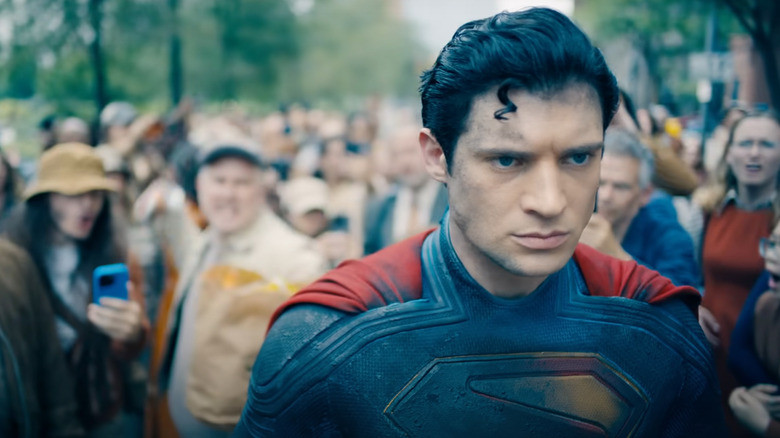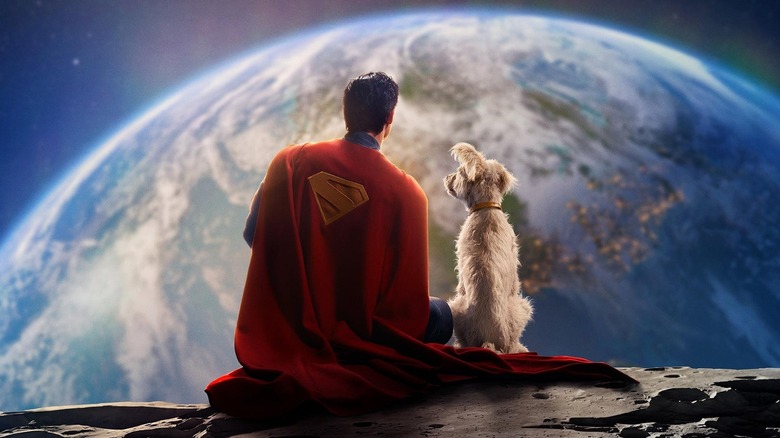James Gunn's Superman Saw The Immigrant Backlash Coming – And The Movie Has The Perfect Response
This article contains major, Krypton-sized spoilers for "Superman."
If the Man of Steel is meant to reflect the world we're living in today, it's only fitting that the most quintessentially 2025 thing ever ended up happening with the newest reboot: "Superman" got cancelled. More accurately, the DC blockbuster became the subject of the most tired, predictable, bad-faith "controversy" that political pundits and grifters could possibly drum up out of thin air. Writer/director James Gunn, certainly not unfamiliar with drama himself, recently made waves for claiming that Superman is, in fact, an immigrant. As a character very clearly defined by his Kryptonian origins versus his eternal struggle to fit in among humans on Earth, Superman's diaspora parallels are as fundamental and well-established as comic book backstories get. Unfortunately, by coming right out and stating this fact aloud, Gunn underestimated the Right-wing Outrage Industrial Complex's unique ability to turn even the most banal observation into grist for the online content mill.
Or did he? Not only does "Superman" live up to its billing as a charming crowd-pleaser, as /Film's Chris Evangelista reviewed here, but its most effective gambit also ends up being its most prescient one. Long before he ever stepped into this supposed quagmire by — and we can't emphasize this enough — stating the obvious, Gunn built the entire screenplay around one key, pivotal moment. After spending much of the first hour portraying Kal-El (David Corenswet) as an unstoppable force for good, motivated in large part by the message of hope his Kryptonian parents left for him, the film drops its biggest and boldest twist yet: His parents actually saved him from the destruction of his home world and sent him to Earth in order to mercilessly rule over humanity, not to save it. Of course, it's only a matter of time before Nicholas Hoult's dastardly Lex Luthor discovers this and unleashes such incriminating knowledge upon the world to ruin Supes' image. In the simplest terms, this is a movie about Superman getting cancelled.
More than that, however, it's a movie specifically filtered through the lens of Superman as a child of two worlds. Though imperfect for a variety of reasons that we'll get into, the immigrant metaphor mostly holds up as the most interesting aspect of this new take on the superhero. It's as if "Superman" saw the backlash coming — and delivered the ideal response.
The real villain in Superman is fear of the outsider
When Superman's world comes crashing down around him thanks to Luthor's media blitz, the main focus of the film comes into view. Up to that point, the Big Blue Boy Scout has been depicted as exactly that: beloved, trusted, and accepted by the people of Earth for his rigid belief in doing good. Tellingly, the opening scene kicks off with his first real failure in over three years of operating as humanity's most powerful hero, decisively beaten by the so-called Hammer of Boravia (in actuality, the metahuman Ultraman created by Lex Luthor). But here's the rub: Once the general public is given just one semi-plausible reason to suspect Superman's true motivations, well, the love affair abruptly ends. Protective parents snatch their kids away from his reach, angry mobs form bent on violence and rage, and a pernicious rumor about his "secret harem" seems to be the main bit of fear-mongering that takes hold among both world leaders and political talking heads.
Sound familiar? It's not exactly much of a reach to draw connections between how Superman is treated by the people of Metropolis and how large swaths of Americans have been whipped into a xenophobic frenzy against the migrant boogeyman over the last several years. Undocumented immigrants will harm your children, start riots, and assault your women ... or so claims that insidious narrative, at least. In stark contrast, this movie presupposes that naturalized citizens are inherently trustworthy. Lex Luthor might be the one pulling the strings, but like a certain cable news channel he shares much in common with, he merely takes advantage of a rot already festering in the hearts and minds of far too many: a deep, ingrained, and irrational fear of the outsider.
Now, admittedly, the Superman-as-immigrant metaphor is far from a flawless one. There's no getting around the optics that the Last Son of Krypton is a superpowered, square-jawed, white-skinned, blue-eyed alien perfectly capable of hiding in plain sight whenever he wishes — privileges most real-life immigrants do not possess. And with "Superman" in particular, the idea that the mass fear our title character inspires is actually rooted in certain elements of truth can't help but muddy the message a bit. But even these inconsistencies aren't enough to overcome the real hidden strength at this tentpole's core.
Superman is all about the double standards immigrants have to contend with
"Superman" saves its most cogent thematic point for last. After foiling Luthor's plot to incite Boravia's invasion of Jarhanpur through the help of the Justice Gang and safely containing the multidimensional rift tearing Metropolis apart, Superman pays a little visit to Lex Luthor in his control room. The immovable object and unstoppable force finally have it out, directly confronting their vastly different perspectives on what Superman truly represents. To Lex, the root cause of his burning hatred comes from his belief that the all-powerful hero is too alien and too foreign for mere mortals to ever understand or relate to in any way. This also fuels his hypocritical envy, forever comparing his own ambition and legacy to someone the world initially embraced. To Superman, this is all backwards. His true power is his humanity: his innate character flaws, his tendency to make mistakes, and his ability to rise above such shortcomings.
It's here where "Superman" throws down the gauntlet and suggests a radical antidote to the anti-immigrant sentiments so prevalent in the world today. In essence, this is the rare mainstream blockbuster to actually get at the truth of what so many people of color contend with on a daily basis: the unfathomable double standard to be perfect at all times. It's why so many immigrant parents (my own included) instill a tireless work ethic and discipline in their children from a young age – because they came to a land where they struggled twice as hard to be considered worthy of half the benefits so many others are born with, no questions asked. It's why the tragic fate of Malik Ali (Dinesh Thyagarajan) leaves such a bad taste in the mouth, a life needlessly snuffed out to fuel an agenda based on suspicion and fear. And it's why the film goes out of its way to have Clark tell Lois that, yes, Jarhanpur might have a checkered political history ... but insist that doesn't mean its populace deserves to die by genocide.
Though Superman's most well-known catchphrase about "Truth, Justice, and the American Way" is never uttered in dialogue here, few adaptations better understand the role that normal, flawed, and deeply human immigrants play in making that ideal come true — no matter what any backlash may say.
"Superman" is now playing in theaters.


